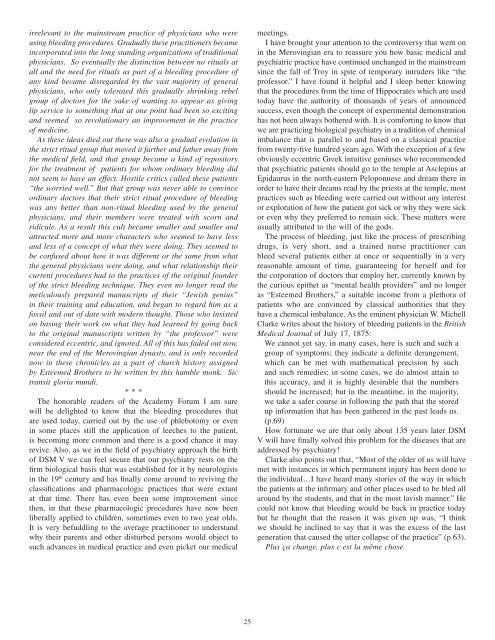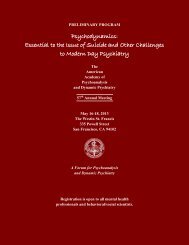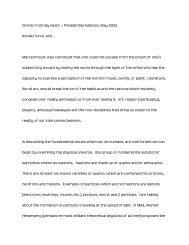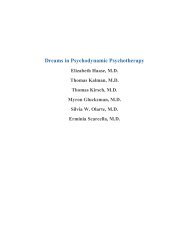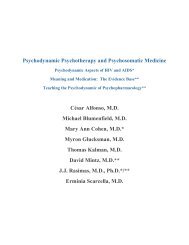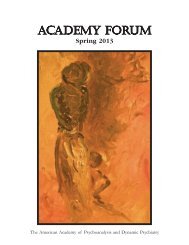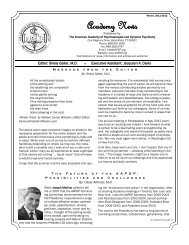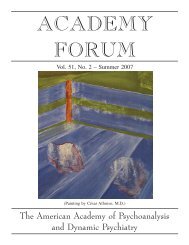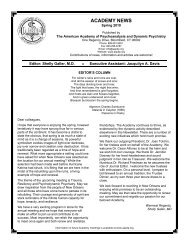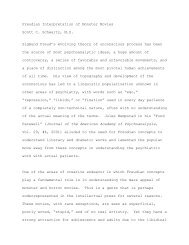ACADEMY FORUM - The American Academy of Psychoanalysis and Dynamic ...
ACADEMY FORUM - The American Academy of Psychoanalysis and Dynamic ...
ACADEMY FORUM - The American Academy of Psychoanalysis and Dynamic ...
Create successful ePaper yourself
Turn your PDF publications into a flip-book with our unique Google optimized e-Paper software.
irrelevant to the mainstream practice <strong>of</strong> physicians who were<br />
using bleeding procedures. Gradually these practitioners became<br />
incorporated into the long st<strong>and</strong>ing organizations <strong>of</strong> traditional<br />
physicians. So eventually the distinction between no rituals at<br />
all <strong>and</strong> the need for rituals as part <strong>of</strong> a bleeding procedure <strong>of</strong><br />
any kind became disregarded by the vast majority <strong>of</strong> general<br />
physicians, who only tolerated this gradually shrinking rebel<br />
group <strong>of</strong> doctors for the sake <strong>of</strong> wanting to appear as giving<br />
lip service to something that at one point had been so exciting<br />
<strong>and</strong> seemed so revolutionary an improvement in the practice<br />
<strong>of</strong> medicine.<br />
As these ideas died out there was also a gradual evolution in<br />
the strict ritual group that moved it farther <strong>and</strong> father away from<br />
the medical field, <strong>and</strong> that group became a kind <strong>of</strong> repository<br />
for the treatment <strong>of</strong> patients for whom ordinary bleeding did<br />
not seem to have an effect. Hostile critics called these patients<br />
“the worried well.” But that group was never able to convince<br />
ordinary doctors that their strict ritual procedure <strong>of</strong> bleeding<br />
was any better than non-ritual bleeding used by the general<br />
physicians, <strong>and</strong> their members were treated with scorn <strong>and</strong><br />
ridicule. As a result this cult became smaller <strong>and</strong> smaller <strong>and</strong><br />
attracted more <strong>and</strong> more characters who seemed to have less<br />
<strong>and</strong> less <strong>of</strong> a concept <strong>of</strong> what they were doing. <strong>The</strong>y seemed to<br />
be confused about how it was different or the same from what<br />
the general physicians were doing, <strong>and</strong> what relationship their<br />
current procedures had to the practices <strong>of</strong> the original founder<br />
<strong>of</strong> the strict bleeding technique. <strong>The</strong>y even no longer read the<br />
meticulously prepared manuscripts <strong>of</strong> their “Jewish genius”<br />
in their training <strong>and</strong> education, <strong>and</strong> began to regard him as a<br />
fossil <strong>and</strong> out <strong>of</strong> date with modern thought. Those who insisted<br />
on basing their work on what they had learned by going back<br />
to the original manuscripts written by “the pr<strong>of</strong>essor” were<br />
considered eccentric, <strong>and</strong> ignored. All <strong>of</strong> this has faded out now,<br />
near the end <strong>of</strong> the Merovingian dynasty, <strong>and</strong> is only recorded<br />
now in these chronicles as a part <strong>of</strong> church history assigned<br />
by Esteemed Brothers to be written by this humble monk. Sic<br />
transit gloria mundi.<br />
* * *<br />
<strong>The</strong> honorable readers <strong>of</strong> the <strong>Academy</strong> Forum I am sure<br />
will be delighted to know that the bleeding procedures that<br />
are used today, carried out by the use <strong>of</strong> phlebotomy or even<br />
in some places still the application <strong>of</strong> leeches to the patient,<br />
is becoming more common <strong>and</strong> there is a good chance it may<br />
revive. Also, as we in the field <strong>of</strong> psychiatry approach the birth<br />
<strong>of</strong> DSM V we can feel secure that our psychiatry rests on the<br />
firm biological basis that was established for it by neurologists<br />
in the 19 th century <strong>and</strong> has finally come around to reviving the<br />
classifications <strong>and</strong> pharmacologic practices that were extant<br />
at that time. <strong>The</strong>re has even been some improvement since<br />
then, in that these pharmacologic procedures have now been<br />
liberally applied to children, sometimes even to two year olds.<br />
It is very befuddling to the average practitioner to underst<strong>and</strong><br />
why their parents <strong>and</strong> other disturbed persons would object to<br />
such advances in medical practice <strong>and</strong> even picket our medical<br />
meetings.<br />
I have brought your attention to the controversy that went on<br />
in the Merovingian era to reassure you how basic medical <strong>and</strong><br />
psychiatric practice have continued unchanged in the mainstream<br />
since the fall <strong>of</strong> Troy in spite <strong>of</strong> temporary intruders like “the<br />
pr<strong>of</strong>essor.” I have found it helpful <strong>and</strong> I sleep better knowing<br />
that the procedures from the time <strong>of</strong> Hippocrates which are used<br />
today have the authority <strong>of</strong> thous<strong>and</strong>s <strong>of</strong> years <strong>of</strong> announced<br />
success, even though the concept <strong>of</strong> experimental demonstration<br />
has not been always bothered with. It is comforting to know that<br />
we are practicing biological psychiatry in a tradition <strong>of</strong> chemical<br />
imbalance that is parallel to <strong>and</strong> based on a classical practice<br />
from twenty-five hundred years ago. With the exception <strong>of</strong> a few<br />
obviously eccentric Greek intuitive geniuses who recommended<br />
that psychiatric patients should go to the temple at Asclepius at<br />
Epidaurus in the north-eastern Peloponnese <strong>and</strong> dream there in<br />
order to have their dreams read by the priests at the temple, most<br />
practices such as bleeding were carried out without any interest<br />
or exploration <strong>of</strong> how the patient got sick or why they were sick<br />
or even why they preferred to remain sick. <strong>The</strong>se matters were<br />
usually attributed to the will <strong>of</strong> the gods.<br />
<strong>The</strong> process <strong>of</strong> bleeding, just like the process <strong>of</strong> prescribing<br />
drugs, is very short, <strong>and</strong> a trained nurse practitioner can<br />
bleed several patients either at once or sequentially in a very<br />
reasonable amount <strong>of</strong> time, guaranteeing for herself <strong>and</strong> for<br />
the corporation <strong>of</strong> doctors that employ her, currently known by<br />
the curious epithet as “mental health providers” <strong>and</strong> no longer<br />
as “Esteemed Brothers,” a suitable income from a plethora <strong>of</strong><br />
patients who are convinced by classical authorities that they<br />
have a chemical imbalance. As the eminent physician W. Michell<br />
Clarke writes about the history <strong>of</strong> bleeding patients in the British<br />
Medical Journal <strong>of</strong> July 17, 1875:<br />
We cannot yet say, in many cases, here is such <strong>and</strong> such a<br />
group <strong>of</strong> symptoms; they indicate a definite derangement,<br />
which can be met with mathematical precision by such<br />
<strong>and</strong> such remedies; in some cases, we do almost attain to<br />
this accuracy, <strong>and</strong> it is highly desirable that the numbers<br />
should be increased; but in the meantime, in the majority,<br />
we take a safer course in following the path that the stored<br />
up information that has been gathered in the past leads us.<br />
(p.69)<br />
How fortunate we are that only about 135 years later DSM<br />
V will have finally solved this problem for the diseases that are<br />
addressed by psychiatry!<br />
Clarke also points out that, “Most <strong>of</strong> the older <strong>of</strong> us will have<br />
met with instances in which permanent injury has been done to<br />
the individual…I have heard many stories <strong>of</strong> the way in which<br />
the patients at the infirmary <strong>and</strong> other places used to be bled all<br />
around by the students, <strong>and</strong> that in the most lavish manner.” He<br />
could not know that bleeding would be back in practice today<br />
but he thought that the reason it was given up was, “I think<br />
we should be inclined to say that it was the excess <strong>of</strong> the last<br />
generation that caused the utter collapse <strong>of</strong> the practice” (p.63).<br />
Plus ça change, plus cest la même chose.<br />
25


